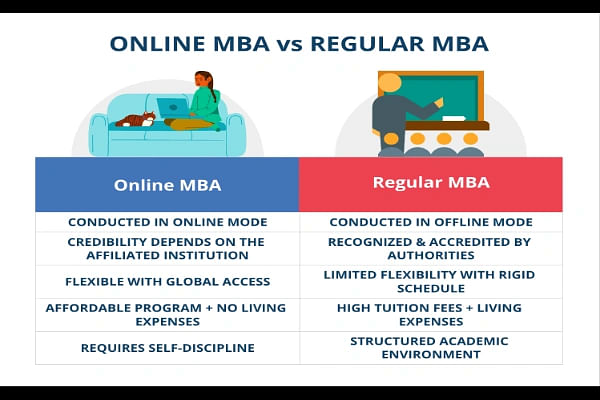Online MBA is a viable option for working professionals who find it challenging to relocate to the institute physically. In contrast, an offline MBA is a better option for students who are not working and want to attend the classes physically.
Students often ask Is an online MBA the same as a regular MBA? An online MBA is best for working professionals who can complete the course with the flexibility of their time. While, a regular MBA requires the candidates to complete the course on campus. The total cost of completing an MBA in these modes is also different. An online MBA shall cost INR 30,000 to INR 10 lakhs in India. While, a regular MBA shall cost INR 3 lakhs to INR 25 lakhs.
However, a regular MBA is considered more reliable and better as it provides the students with real-life experiencs and exploration. It gives them a scheduled campus experience with networking and stronger placement opportunities. The average package of a regular MBA ranges between INR 7 lakhs to INR 15 lakhs. And an online mBA average package ranges between INR 3 lakhs to INR 13 lakhs.
Difference Between Online MBA and Regular MBA

Below is an overview of the differences between the online MBA and regular MBA program on parameters like mode of learning, course duration, system credibility, flexibility, accessibility affordability, faculty experience, type of curriculum, and exam pattern of both MBAs.
| Parameters | Online MBA | Regular MBA |
| Mode of Learning | Completely in the online mode | Classroom-based with daily in-person interaction and campus visits. |
| Duration | 2 years | 2 years |
| Credibility | Credibility depends on the institution offering the course, and many reputable universities offer online programs. | Recognized and esteemed by authorities |
| Flexibility | Highly flexible in schedule | Limited flexibility, rigid class schedules. |
| Accessibility | Global access from anywhere in the world | Institute located at specific place |
| Affordability | It is more affordable than regular programs, but costs can vary | Comparatively high Tuition fees and living costs. |
| Faculty Experience | Faculty often includes industry experts. | Usually experienced and full-time faculty members. |
| Curriculum | Usually, it is of the same standard as the on-campus programs with higher specialisation options. | Standardised and comprehensive, often including specialisations. |
| Exams | Online exams, assignments, and project work. | Regular exams, assessments, and group projects. |
| Placements | Placement opportunities depend on the institution's career support services and industry connections. | Typically, substantial placement opportunities with on-campus recruitment. |
Also Read: Top 10 Online MBA Colleges in India
Online MBA vs Regular MBA Eligibility
The eligibility criteria for online regular MBA program is similar, and to enrol in them, the student must satisfy the below-mentioned educational qualifications, work experience, entrance exams and interview, which are described in detail below:
- Education Qualification: The minimal prerequisite is often a bachelor's degree in any subject from an accredited university. Specific programs could have minimum requirements for academic performance or GPA.
- Work experience: A minimum amount of work experience is required by many MBA programs, especially those aimed at professionals in the middle of their careers. Depending on the curriculum, this may take one to five years of experience.
- Entrance exams: Most MBA programs demand that applicants submit their entrance exam scores for exams such as CAT, MAT, IIFT, CMAT, XAT, SNAP, ATMA, IBSAT, TS ICET, and KMAT.
- Interview: Certain MBA programs may hold discussions with prospective students as part of the application process to determine a candidate's suitability.
Also Read: Top 15 Qualities of MBA Students that Employers Look for In 2026
Admission Process for Online MBA vs Regular MBA
The application process for online and regular MBAs is similar. It starts with the filling of the application form, release of the entrance exam score, counselling process, interview on group discussion, college allotment, and paying of admission fees of the allotted institute.
- Application Form Filling: Filling an application process is the initial step for admission, and later, the admit card is released according to the data of the application process.
- Entrance Exam Scores: Online programs ask for entrance examinations, and the scores are used in the counselling process.
- Counselling Process: After the entrance exam scores are released, the counselling process starts, and upon paying the counselling fees, colleges are allotted according to the choice filling of the students.
- Interview and Group Discussion: Interview and group discussion are essential for most colleges as they consider them necessary criteria for admissions.
- Admission Fee Payment: Paying the admission fees is a necessary condition to lock the seat.
Top Colleges for Online MBA and Regular MBA
The top colleges for MBA programmes are IIM Ahmedabad, IIM Bangalore, IIM Calcutta, Amity University, Dr DY Patil, Pune, IIM Kozhikode, Xavier School of Management, Jamshedpur, National Institute of Industrial Engineering, Mumbai and Indian Institute of Technology Bombay.
Top Online MBA Colleges
The UGC Approved Online MBA Colleges in India 2026 according to the NIRF ranking 2025 are tabulated below with the average program fees of each of the colleges:
| NIRF Ranking 2025 | Top Colleges | Average Program Fees |
| 1 | IIM Ahmedabad | INR 20,00,000 |
| 3 | IIM Kozhikode | INR 2,62,550 |
| 8 | IIM Indore | INR 11,00,000 |
| 21 | NMIMS Global | INR 1,68,000 |
| 28 | Amity University | INR 2,53,000 |
| 31 | Great Lakes Institute Of Management | INR 3,50,000 |
| 37 | MICA, Ahmedabad | INR 1,25,000 |
| 48 | BIMTECH | INR 2,50,000 |
| - | GLA University | INR 1,80,000 |
| - | Dr DY Patil, Pune | INR 1,30,000 |
| - | BITS Pilani | INR 2,42,000 |
Top Regular MBA Colleges
The Top MBA Colleges in India 2026 according to the NIRF ranking 2025 are tabulated below with the average program fees of each of the colleges:
| NIRF Ranking 2025 | Top Colleges | Average Program Fees |
| 1 | IIM, Ahmedabad | INR 25,00,000 |
| 2 | IIM, Bangalore | INR 23,00,000 |
| 3 | IIM Kozhikode | INR 20,00,000 |
| 4 | IIM, Calcutta | INR 13,50,000 |
| 5 | IIT Delhi | INR 11,20,000 |
| 6 | IIM Lucknow | INR 19,90,000 |
| 7 | National Institute of Industrial Engineering, Mumbai | INR 1,92,000 |
| 8 | IIM Indore | INR 3,20,850 |
| 9 | Xavier School of Management, Jamshedpur | INR 8,50,000 |
| 10 | Indian Institute of Technology Bombay | INR 3,20,850 |
Online MBA vs Regular MBA Salary
The scope of opportunity in the salary of MBA after the candidate is terminated below with their job rules like restaurant manager, duty manager, assistant sales manager, head chef, and the average salary, respectively, is listed below.
Job Scope & Salary of Online MBA
The job scope after completion of the online MBA degree program is PR specialist, media planning manager, marketing research analyst, chief financial officer, financial advisor, and cash manager. The average salary of all these opportunities is tabulated below:
| Job Roles | Average Salary |
| PR Specialist | INR 10 LPA |
| Media Planning Manager | INR 12 LPA |
| Market Research Analyst | INR 12 LPA |
| Chief Financial Officer | INR 11 LPA |
| Financial Advisor | INR 12 LPA |
| Cash Manager | INR 9 LPA |
Also Check: Career After MBA 2026
Job Scope & Salary of Regular MBA
The job scope after completion of the regular MBA degree program is supply chain manager, financial analyst, human resource manager, operations manager, and chief operating officer entrepreneur, and the average salary of each of the occupations is tabulated below.
| Job Roles | Average Salary |
| Supply Chain Manager | INR 12 LPA |
| Financial Analyst | INR 10 LPA |
| Human Resources Manager | INR 13 LPA |
| Operations Manager | INR 12 LPA |
| Chief Operating Officer | INR 11 LPA |
| Entrepreneur | INR 8 LPA |
Why Should One Choose an Online MBA?
A few reasonsto understand is an online MBA worth it has been shared below.
- Flexible Schedule- Not everyone has the financial means to pursue an MBA full-time with hefty fees. One might not be able to enrol in a regular class for several reasons, including workload, family obligations, unpredictable working hours, and unclear HR policies surrounding study leave.
- Remote Environment- Sometimes the personal and professional obligations prevent students from being able to move to the B-school campus, therefore, students may have no choice but to stay in their current position and complete their MBA.
- Self Discipline- Unlike regular MBA programmes, online MBA students must be self-disciplined to complete the degree programme.
Also Read: Online MBA from IIM
Why Should One Choose a Regular MBA?
Among the many reasons to choose a regular MBA program, the most essential ones are a structured environment, personal gatherings and conversations, opportunities for networking, and thrilling University life:
- Structured Environment: Standard MBA programs have a clearly defined structure and flow of courses. Students consistently show up for classes, sign up for seminars, turn in assignments on time, and take the semester's final exam. An atmosphere with such clear boundaries and structure aids in developing a systematic approach to learning.
- In-person gatherings and conversations: One of the most significant benefits of getting a conventional MBA over an online one is the opportunity to engage in numerous conversations with professors and fellow students at frequent gatherings inside and outside the classroom. These gatherings and conversations are a crucial component of the learning curve.
- Opportunities for Networking: After the completion of the MBA program, networking will play a significant role in helping them land at the type of job they want. Although online MBA courses provide networking opportunities, traditional programs offer more opportunities because of the increased in-person encounters. One of the significant benefits of a conventional MBA school is networking.
- Thrilling University Life: Reputable business schools enrol many international students in their regular MBA programs. Being a member of an ethnically diverse group exposes students to various cultures, viewpoints, and values. One can develop as a leader with a broad perspective on companies and life.
Also Read: 15 Commonly Asked MBA Interview Questions
Choosing between an online MBA vs regular MBA must depend on essential parameters such as availability of time, desire for a campus experience or remote flexibility in schedule, economic conditions, diversity of course, self-discipline, work commitments, learning style and career aspirations.
The compatibility of the mode of learning in an MBA program solely depends on individuals, and students must critically analyse the points mentioned above to decide which type of course suits them better.










